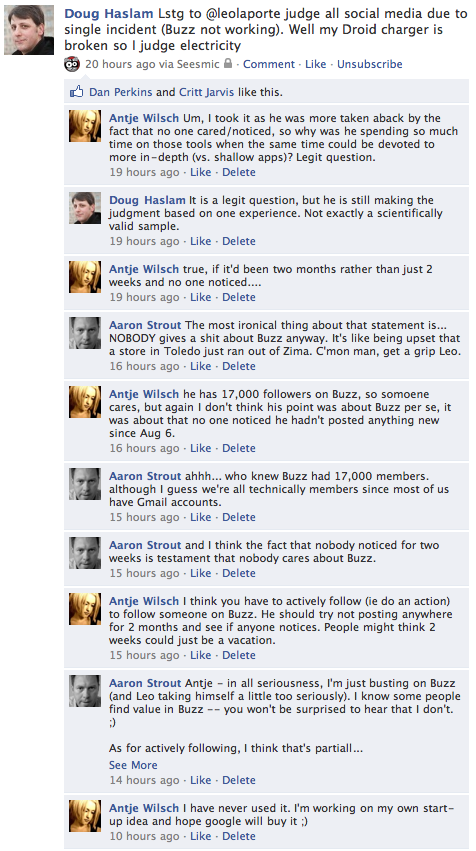I was intrigued by the latest tirade from Leo Laporte, hoist of “This Week in Technology” (TWiT), a podcast I listen to every week. After discovering that Google Buzz had not been updating for a couple of weeks, he was more miffed by the fact that noone seemed to notice than the fact that Buzz wasn’t working. So, in his post, “Buzz Kill,” Leo essentially concluded that social media was useless and was quitting, much as he had earlier quit Facebook, and had much earlier left Twitter (and came back, though the reasons there had more to do with the “TWiT” trademark, I think).
By the time the weekly TWiT podcast had been recorded., it seemed that Leo had backed off his position a bit, which underscores my reaction: isn’t declaring social media useless due to the failure of Buzz something like declaring electricity useless because I am having problems with the charger port on my Motorola Droid? (Verizon is kindly sending me a new unit, by the way. Very nice of them).
So, here are my thoughts:
- Don’t blame an entire idea if one component fails. Even if the symptom- that noone noticed your missing points when Buzz went down- are telling, one incident does not indict an entire industry. Be scientific before you condemn something
- If something is not working for you, move on
- If something is not working for you, determine what is. People were apparently wither getting Leo’s show notes and notifications elsewhere- perhaps on the site or their podcast downloader- or, like me, rarely bother looking up the show notes at all. My podcatcher works fine, and actually display show notes should I want them. Maybe the effort putting them on Buzz isn’t worth it.
- Be wary of posting- and reading- kneejerk reactions. Leo, by his own admission, posted at 1:00 AM, and probably not long after he discovered the problem. It was a rant, and as I mentioned, he pulled back on his contention that social media was useless.
When I posted a reaction to this whole thing on Facebook, a nice discussion sprang up among myself, Antje Wilsch and Aaron Strout. I know Aaron pretty well, and don;t take lightly his dismissal of Google Buzz– but I use Buzz effectively, if not as the “social network” that Google may have hoped for:


Twitter Comment
RT @DougH: New post: Let He Who is Without Buzz.. er, Don’t Judge Social Media by Failure of One Tool [link to post]
– Posted using Chat Catcher
Doug,
Thanks for the shout out (or should I say “mention” — @ShelIsrael was asking earlier today why “mentions” are now called “shout outs.”)
I like your overarching point which is, stop with the knee jerking over how/why social media sucks. If you don’t like it or it does you wrong, move on. People are tired of sour grapes. Ironically, I remember Leo wondering aloud on Twitter why more people weren’t leaving Facebook and joining him over on Buzz (I don’t know, maybe because Facebook is fun and Buzz isn’t).
As for my distaste for Buzz, I guess I just don’t see it’s real value. Maybe I should spend more time with it but it doesn’t seem to add any additional value for me beyond what Twitter and Facebook provide. And all of my social graphs happen to live (mostly) in those two places. To that end, I am genuinely interested in what motivates you to use Buzz as you are someone that I respect highly and whose words I too do not take lightly.
Best,
Aaron | @aaronstrout
Twitter Comment
@DougH liked your post. just commented… “Don’t Judge Social Media by Failure of One Tool” [link to post]
– Posted using Chat Catcher
Twitter Comment
Don’t judge social media by the failure of one tool: [link to post]
– Posted using Chat Catcher
Aaron,
Thanks man- I can hardly call this calling out Leo, since he pulled back- and even got his Buzz account fixed by the Google folks. But yes, we run into the argument about letting the tools represent the concepts– there are lots of ways to get things done– and listeners were obviously getting their TWiT info in other ways.
As for Buzz– I don’t get much value in the way it was intended, but its integration with GMail, Google Reader and other Google (not to mention links to Twitter, Facebook et al) make it a bit more intrinsically useful,rather than being some sort of new social network.
[…] media and recommits to blogging. He’s since dialed back a bit, and Doug points out that one shouldn’t judge the effectiveness (or lack thereof) of social media by the failure of one tool. Jen notes that there […]
You also need to ask the question: how can a stupid tool get ANY traction? Simple answer is: Google announces it
Unlike days gone by, no one does research ahead of time. They simply build a prototype and launch it. That creates the hype cycle of good and bad. And, let’s be honest: Google Buzz is bad on every front.
[…] media and recommits to blogging. He’s since dialed back a bit, and Doug points out that one shouldn’t judge the effectiveness (or lack thereof) of social media by the failure of one tool. Jen notes that there […]